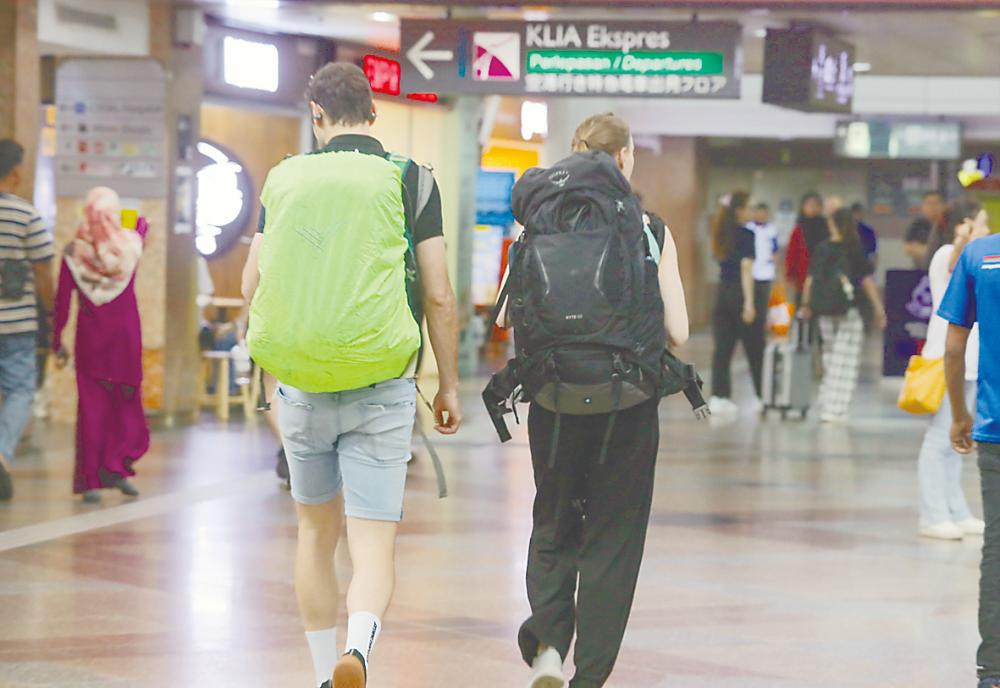PETALING JAYA: Foreign backpackers begging locals for money has become a growing concern in Malaysian cities, raising frustration among the public and authorities.
A backpacker was recently spotted at the southbound Ulu Bernam rest and service area in Selangor with a cardboard sign asking for funds to return home after nine years of travelling. The incident sparked outrage online, with netizens criticising his behaviour and calling on authorities to clamp down on such tourists.
Kuala Lumpur Immigration Department director Wan Mohammed Saupee Wan Yusoff said the city, which is a popular tourist destination due to its affordability and attractions, has increasingly faced issues with allegedly stranded backpackers, or “begpackers”.
“These people resort to begging, conducting street performances or hawking when they run out of funds. Hotspots for such activities are Bukit Bintang, Brickfields, Jalan Tuanku Abdul Rahman, Chow Kit and the Central Market.”
He added that foreign nationals found begging would face legal consequences under the Immigration Act 1959/63.
“If they are found contravening their visa or pass conditions, they may be fined, prosecuted and deported. Begpackers are categorised as prohibited immigrants under Section 8 of the Act.”
He stressed that the issue goes beyond contravening visa conditions as many begpackers are motivated by financial gain.
“The department conducts enforcement activities throughout Kuala Lumpur based on public complaints, proactive measures and intelligence gathering as we do not take the matter lightly.”
He said when detainees lack valid travel documents or financial means to return home, the department contacts the respective foreign embassies to verify their nationalities, and the embassies then coordinate with their families to facilitate the purchase of return tickets.
Measures to prevent such matters include stringent visa processing requirements to ensure travellers can support themselves financially during their stay.
For instance, travellers must present supporting documents to immigration officers at airports, including return flight tickets, hotel bookings, travel itineraries and proof of sufficient funds, before being granted entry.
The department also posts notices, warnings and updates on its website, and publicises enforcement actions to emphasise that violating Malaysian laws is a serious offence.
“Begpackers pose social and economic problems, aside from becoming a burden to our public healthcare facilities and public health as a whole. They cause public unease and inconvenience.”
Universiti Teknologi Mara Selangor tourism economics lecturer Prof Dr Mohd Hafiz Hanafiah said the rise of begpackers in Malaysia reflects a lack of respect for local culture and socioeconomic realities.
“Malaysia is known for its hospitality but such behaviour smacks of exploitation and undermines the true spirit of cultural exchange and adventure that backpacking is meant
to represent.”
He said begpackers harm Malaysia’s reputation by portraying the country as a destination that tolerates such exploitation, risking having the positive experiences of responsible travellers overshadowed.
“Begpackers often divert charity and street income away from those who genuinely need it, such as struggling street artistes. This could desensitise communities, reducing support for people in genuine need.”
He urged authorities to enforce stricter tourist visa regulations and monitor public spaces to stamp out the begpacking menace, noting that Thailand and Indonesia have implemented stricter visa checks and awareness campaigns while Singapore has strict anti-begging laws.
“Malaysia should adopt similar measures to safeguard its reputation as a country that appreciates and welcomes all tourists, including backpackers, provided they conduct themselves responsibly.”









